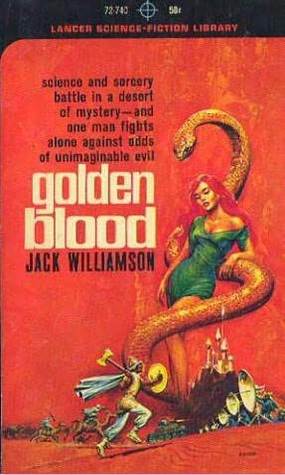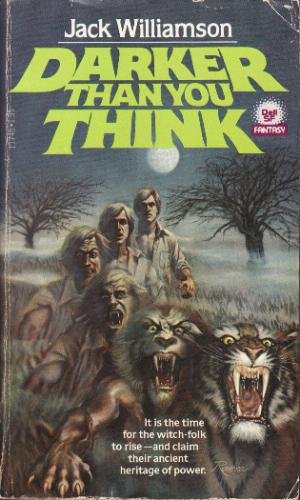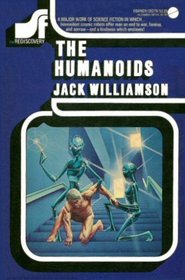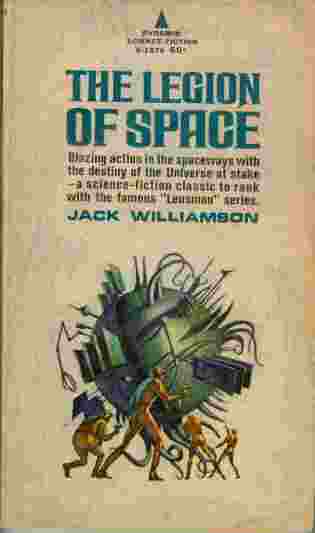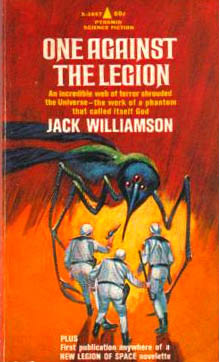Tangent Online Presents:
An Interview with Jack Williamson
![]()
(April 29, 1908 – November 10, 2006)
(Ed Hamilton/Jack Williamson photo by Dave Truesdale}
Interviewer:
Dave Truesdale
Location:
Minicon 11
Minneapolis, MN, April 16-18, 1976
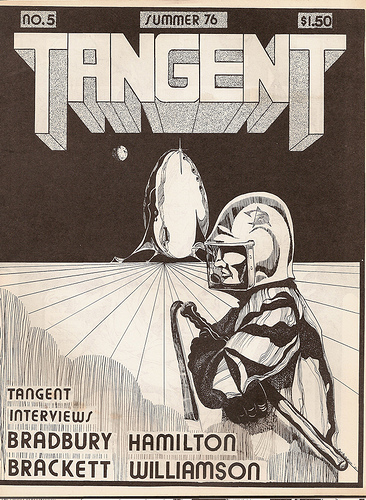
Interview originally appeared in Tangent No. 5, Summer 1976, and is reprinted here for the first time.
Introduction
This is the last of the interviews originally seeing print in the Summer 1976 issue of Tangent (and the first of three issues before his death that legendary fan and editor Ray Palmer would print from his converted barn to print shop in Amherst, WI). The Leigh Brackett/Edmond Hamilton interview can be found here, and the Ray Bradbury interview is here.
I haven’t read this Jack Williamson interview in at least fifteen years, and as I type it is just over thirty-nine years old. Frankly, I was amazed at what I was reading, as Jack held forth on SF criticism, the Nebula and Hugo awards, his views on the New Wave, the growing diversity in the field, his thoughts on “women’s libbers,” and much more. Fascinating stuff.
I was twenty-five at the time and Minicon 11 was, I think, my fourth or maybe fifth convention. I was still wide-eyed and full of the wonder of it all—that there were such things as science fiction conventions and that here I was, interviewing many of my favorite SF writers. This interview, like several posted here, are products of their time. I asked a number of authors many of the same questions—the hot topics of the day inside and outside of the science fiction world, in order to get some sort of pulse on what at least some in the field were thinking when it came to the Nebula and Hugo awards, or differing editorial views on what they looked for in a book, or what they thought of feminism (called “women’s lib” back then). The responses were varied and instructive on many levels, including Jack’s, presented here after nearly forty years.
I have decided to reprint verbatim my original introduction, informal and brief as it is. First, however, for those coming to Jack Williamson for the first time, here is a partial list of his many accomplishments (minus his Hugo and Nebula awards):
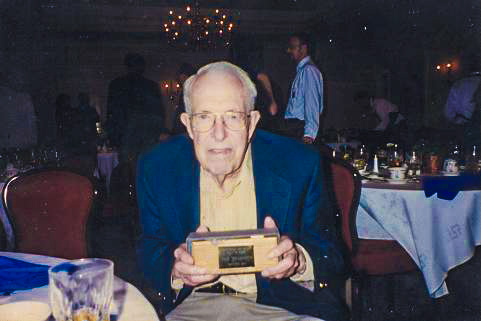
Unquestionably, Jack Williamson’s most famous story is “With Folded Hands,” which brilliantly demonstrates one of the major themes occurring in his work, that of freedom vs. social control. It appeared in the July 1947 issue of Astounding and has been reprinted countless times.
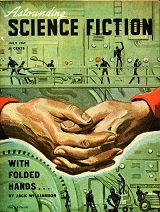
These honors don’t begin to scratch the surface of Jack Williamson’s career. A good preliminary starting point is his wikipedia page. Haffner Press has for some years now been reprinting collections of Jack’s work in gorgeous hardcover collector editions. A little pricey but worth every penny and more. You can find them here, and I have linked several covers throughout the interview to the Haffner Press website.
I hope you enjoy the interview.
Original introduction
I have the utmost admiration for Jack Williamson. He speaks quietly and slowly with a barely discernible southwestern “drawl,” and is therefore deceptive to some. I say deceptive because as I talked with him during Minicon 11 it became quite apparent that what he was saying was just as important and experience-laden and wise as those who speak loudly and hype their views with untoward aggressiveness.
Jack is a nice man, a pleasant man, a fun man, a writer, fan, teacher, critic, and one time farm boy. He is a little of everything. He began writing science fiction while still in his teens, tried college for a while, dropped out because it had nothing to do with science fiction, and although he now has his Ph.D. there were many years in between where he established himself as one of the all-time greats of science fiction. I hope you find as much interesting and thought-provoking material in the following interview as I did, while meeting and talking with him for the first time. I’m glad I can share it with you.
Oh, by the way, an ace photographer I’m not. The picture above is the only one out of three of Jack that turned out, but I don’t think he’d mind sharing space with Ed Hamilton. Would you, Jack?
TANGENT: How did you get into your teaching post at Eastern New Mexico University?
JACK WILLIAMSON: Well, it was my home town. I guess I got into teaching because of a comic strip called “Beyond Mars.” While that was running—it didn’t take all of my time—I started taking a few courses. I also got used to having a regular weekly check. When the comic strip died I asked for a graduate assistantship in English; eventually came back with a Ph.D.
Potales is my home town, by the way. Let’s see, Mark Hillegas had taught his first science fiction course at Colgate in 1962 and published an article about it in The National Observer. I read that and was fascinated and was fortunate enough to get a science fiction course into our catalog, and I’ve been teaching it since ’64 I think.
TANGENT: What were you doing before you were doing “Beyond Mars”? Any science fiction?
WILLIAMSON: Yes. I was still a full-time writer. The comic strip began in 1952 and ran until 1955. It was started by the people at The New York Sunday News on the theory that they needed an answer to TV. With TV coming in their circulation was dropping off, but it turned out that my strip was not the answer to TV. They killed it.
TANGENT: You’ve been involved in science fiction for many years now. How did you get into it, and why?
WILLIAMSON: Well, I grew up on a dryland homestead in eastern New Mexico, and times were pretty grim—financially. Our homestead wasn’t suitable for agriculture in the first place and times were not very good for agriculture generally, and I came out of high school with vague ambitions to be a scientist, but no prospect for a scientific education or anything of the sort. When I came across copies of Gernsback’s old Amazing it was a fantastic new world. I was absolutely fascinated with the color, the glamour, the wonder and so forth, of the stories—
TANGENT: How old were you at this time?
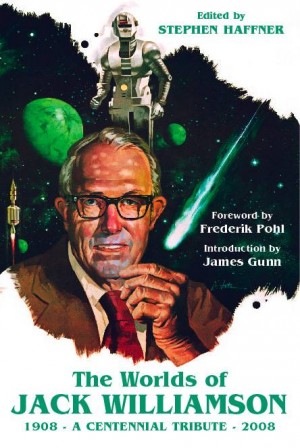 WILLIAMSON: I guess I was seventeen when I first saw Amazing Stories. I was twenty when my first story was published. And I’ve been involved with science fiction ever since and I don’t regret it (smiling).
WILLIAMSON: I guess I was seventeen when I first saw Amazing Stories. I was twenty when my first story was published. And I’ve been involved with science fiction ever since and I don’t regret it (smiling).
TANGENT: What was your audience back then? What did you try to do in your stories? Did you ever write for the money?
WILLIAMSON: I was reading the magazine and had a notion of the readership. I wanted to write stories like A. Merritt and Burroughs. My mother had literary ambitions. She bought a paperback book on correspondence fiction writing that I read, and that was sort of my technical training.
TANGENT: Did she encourage you to write?
WILLIAMSON: Oh, yes. My father was pretty pessimistic about the possibilities of my making a living out of writing…with good reason.
TANGENT: After you’d been writing for several years and had become somewhat established, what changes did you note in your own writing and of that in the science fiction field?
WILLIAMSON: Well, certainly the field was changing. Gernsback was reprinting good stories but he was not a very competent editor in that he had no creative suggestions of his own and didn’t pay very willingly for material, and so on. I’m indebted to him for buying my stories, but for not much else. When Astounding came along they had a definite editorial policy. They wanted well-constructed stories…they were pulp stories, they had their limitations, but they had to have a beginning, middle, and end with motivated characters, action, and character revealed through action, and so forth. So I think I learned something from working with a pulp editor.
Of course, I discovered Weird Tales too, and was fascinated with that. I was reading other pulps, and was excited about what I knew about other pulp writers such as Max Brand. Well, my literary horizons were pretty limited. What I wanted to do was make a living as a pulp writer. This notion of getting material into book form, and as they say, writing literature with a capital “L,” were things just beyond my horizon. It occurred to me since, that what I was trying to do was something more like the oral epic than literature, something that was created rapidly and had an effect that wasn’t intended to last.
TANGENT: Who were some of your early influences, in thought as well as writing?
WILLIAMSON: Well, probably A. Merritt first…and most of all. The people I read, like Burroughs, and all the people who were being reprinted in the earlier magazines. I sort of apprenticed myself, after a number of years, after Miles J. Breuer, who was another writer and a practicing physician, and who showed a measure of craftsmanship I admired. I worked with him for awhile and published a story in collaboration with him. I did most of the writing and he made suggestions and revisions. And then when I discovered H. G. Wells—I guess I’d been writing for a couple of years and had gone off to college—he was probably as important an influence as any. I was and still am a great admirer of Wells. I bought and read a collection of his short stories. I read them one at a time with a great deal of admiration and satisfaction.
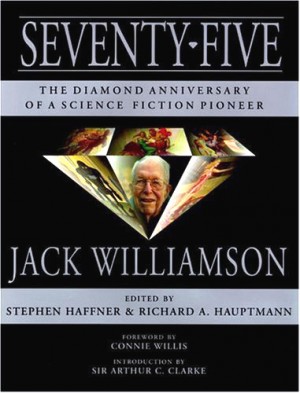 TANGENT: When First Fandom “organized” itself and the first “Worldcons” as such came into existence, how did you feel about them and how did you get started in it all?
TANGENT: When First Fandom “organized” itself and the first “Worldcons” as such came into existence, how did you feel about them and how did you get started in it all?
WILLIAMSON: I’ve always been interested in fandom. Back around 1929 or 1930 when they had what they called the International Correspondence School—this was the first fan organization that I know of—we didn’t print the fan magazines, we had no printing facilities. The theory was that we would write a sort of circular letter that would go around from one fan to another. I think someone broke the chain before it got very far… But at that time there were maybe a dozen or so interested fans that I knew about. It’s amazing to me to see the number increased to many, many thousands.
TANGENT: Who were some of the old fans you can remember?
WILLIAMSON: Well, Ray Palmer is a name I can recall. Most of the names have slipped my mind.
TANGENT: What was your relationship with Ray Palmer?
WILLIAMSON: He was a member of this same group. We used to exchange letters. I remember when he wrote me and told me he had sold a story called “The Time Ray of Jandra.” I didn’t meet him until many years later. He was as enthusiastic as I was about science fiction.
TANGENT: Moving up in time now: what are your reactions to the “New Wave” type of writing? Was there anything to be gotten from that aside from a shaking-up of the field?
WILLIAMSON: I think our field is diversifying and multiplying. The New Wave was an effort to make it Literature, and it seemed to me that many of the New Wave experiments or innovations were things that were tried, generally tried, not very successfully, many years ago in mainstream fiction. You know, beginning a story with the last line, or the slice-of-life thing that John Brunner did on Stand on Zanzibar. This is the same thing Jon Dos Passos was doing, and which I didn’t like, many years ago.
But…there’s no question that much of the earlier science fiction had been crude and written with emotion and enthusiasm, but not much craftsmanship. The New Wave brought in an emphasis on style and craftsmanship and so forth, that I think has improved the level of the whole field. So, I think we have a multiplication of the types of science fiction, and increasing skill in the sophistication and insight. I think the field is growing up and maturing—
TANGENT: Do you think we’ll eventually have a balance when the pendulum swings toward synthesis?
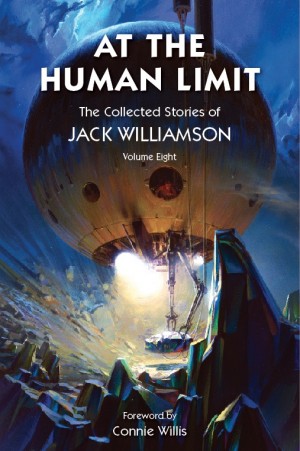 WILLIAMSON: It seems to me that we have more people in the field, a sort of multiplication and diversity of audiences, and there are a lot of people who like Dhalgren who’ve outgrown Burroughs let’s say, but I think the new fans just coming into the field will enjoy Burroughs more than they will Dhalgren.
WILLIAMSON: It seems to me that we have more people in the field, a sort of multiplication and diversity of audiences, and there are a lot of people who like Dhalgren who’ve outgrown Burroughs let’s say, but I think the new fans just coming into the field will enjoy Burroughs more than they will Dhalgren.
TANGENT: Could you tell us some of your feelings, or criteria, on criticism?
WILLIAMSON: Well, essentially a reviewer is a reporter. You need the reviews before you buy the book in order to know what kind of book it is, whether you’d like the book or not, whether you’d be interested in it or not. The critic you read after you’ve read the book, and he relates it to all sorts of things.
Concerning criticism: It seems to me that there are very few absolutes in it; there’s a lot of relativity in it. I would say the business of criticism is to help us understand and appreciate literature. There’s been all sorts of experiments—efforts to make criticism a science. The most interesting of these that I know about was done by I. A. Richards, in a book called The Principles of Literary Criticism, written about fifty years ago, in which he was considering…well, literature as communicating ways of responding to life, to experience. And also that some responses are better than others. He tried to work out a psychological theory on the basis that we have all sorts of impulses that are mutually exclusive, that the best responses would give us the total, best satisfaction in the long run.
It was theoretically interesting, but not very productive. I mean, in answer to that you can say that some cultures would value some responses and other cultures value other responses. But I’m interested in Linguistics and the notion of a piece of literature as a linguistic form at the top of the hierarchy that you get when you go up through the morpheme to the sentence to the paragraph.
A work of literature has some sort of meaning, it is an element of language, it involves the whole relationship between the writer, the audience, and the world.
From this you can go to a sort of formal criticism that depends on the writer and the audience having a common understanding of a form, or a genre, such as the sonnet or the five-act drama or the hard science fiction or the soft science fiction, and so forth. And then you can criticize a work of art in formal terms. Does it fit the definition? And that also means, does it fit the pattern that people have learned to understand and accept?
TANGENT: Shall we just speak of criticism and eschew flagrant commercialism in this?
WILLIAMSON: I would say that there are all sorts of audiences and times change and patterns change, and so forth; the world doesn’t stand still. When James Joyce came along he had to educate a new audience to understand what he was doing.
TANGENT: He had to educate the audience? Do you think that a valid thing to do?
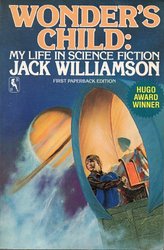 WILLIAMSON: A lot of people thought James Joyce was snobbish. I just happened to be fond of the Joyce I’ve been able to read. I didn’t get all the way through Finnegan’s Wake, but… I think, in my opinion, that Ulysses is the Great American Novel. When Joyce first began getting into print he had a lot of trouble. It took him about eight years to get The Dubliners into print, and then it sold about 300 copies, and of course it’s now used in college courses everywhere. He had something new to say and he invented a new way of saying it, but it didn’t work until people learned how to read him.
WILLIAMSON: A lot of people thought James Joyce was snobbish. I just happened to be fond of the Joyce I’ve been able to read. I didn’t get all the way through Finnegan’s Wake, but… I think, in my opinion, that Ulysses is the Great American Novel. When Joyce first began getting into print he had a lot of trouble. It took him about eight years to get The Dubliners into print, and then it sold about 300 copies, and of course it’s now used in college courses everywhere. He had something new to say and he invented a new way of saying it, but it didn’t work until people learned how to read him.
TANGENT: What was his audience, then? He may be taught in the classroom, but his stuff is not, generally, what people would go to the bookracks and buy for enjoyment. Isn’t he, like many others, at the mercy of the buying public?
WILLIAMSON: Ulysses has sold somewhere around 500,000 copies. I think Joyce was doing all kinds of exciting things. He’s contrasting modern man’s opinion of himself to the classic Greek’s opinion of himself. He has an anti-hero who’s a nobody, in contrast to Odysseus who’s a hero. What he’s saying is something positive about it; he inverts all the values of the Homeric epic and other things. His Penelope can’t even be faithful for twenty hours, much less twenty years, but he says something positive about this. He says that life is worth living, even for Leopold Bloom in Dublin in 1904. This seems to me to be something worth saying, and he found a way of organizing the trivia, the events of ordinary life, in an ordinary city, and this is something worthwhile, worth sharing. That is, he’s taking a piece of experience and giving it order, a direction, a meaning, and I think that’s what literature is all about.
TANGENT: What about Malzberg and Silverberg, who don’t think they’re getting what is due them?
WILLIAMSON: Well, I don’t happen to be able to read Malzberg. I have a great admiration for Silverberg, and what he’s trying to do, and I don’t want to set up any barriers or limits, or whatever. To get back to Chip Delany: I can’t read Dhalgren—I haven’t read it yet. I think I could if I took some time and so forth, but I have a great admiration for The Einstein Intersection. I’ve taught it in my science fiction class and it seems to me that The Einstein Intersection uses a lot of myth, and all sorts of tricks to say something that is very meaningful. He does this with an organized pattern with a beginning, a middle, and an end—the unity and so forth. As I understand Dhalgren, as I’ve sampled it, it is deliberately formless and gets nowhere. For me, at this stage, it doesn’t work. It’s sold somewhere around a quarter of a million copies, so to a lot of people, apparently, it works. Now, I don’t want to say it’s bad literature; there’s all sorts of audiences and what works for one doesn’t work for the other.
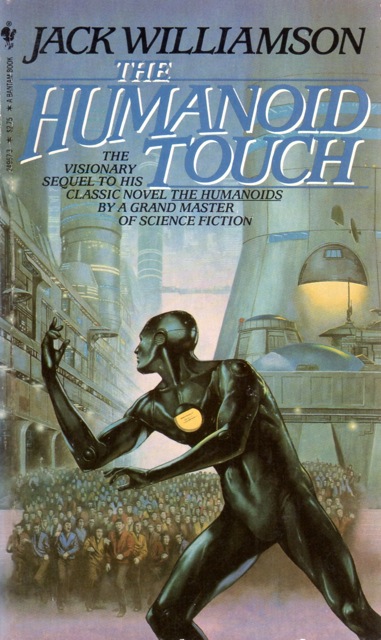 So far as I can see, it’s all pretty much alike. Of course, what made my background, my pulp education or whatever—I want a story with a problem and a solution, a pattern, and I feel this patterning is basic to language. In a sentence you have to have a subject and a predicate, and I look for a similar pattern in a short story or novel. If it isn’t there…it seems to me that one of the possibilities of meaning is gone.
So far as I can see, it’s all pretty much alike. Of course, what made my background, my pulp education or whatever—I want a story with a problem and a solution, a pattern, and I feel this patterning is basic to language. In a sentence you have to have a subject and a predicate, and I look for a similar pattern in a short story or novel. If it isn’t there…it seems to me that one of the possibilities of meaning is gone.
A lot of experimental writers deplore plots. They feel that plotting is sort of a crude, amateurish, primitive device, a restriction even. I like to feel that you can use plot to reveal character, to state theme, to animate setting. In my opinion, this is the most successful way for most writers, and readers.
TANGENT: What are the criteria for the Nebula awards? Are there any formal criteria for judging, or is it a totally individual thing among the authors voting?
WILLIAMSON: So far as I know, there has been no formal effort to establish criteria. They just vote for the works they think are best. I don’t think there’s any uniformity there. My own standards would be a total, strong, emotional effect, a successful expression of something I feel is most significant, original, and so forth. Character, plot, mood, theme, style, would all come into this, of course. But for each writer/member the criteria would be different.
I think the Nebula has been justly criticized, from the fact that most people don’t read all of the eligible stories; many people are inclined to vote for reasons that are not entirely (smiling) —
TANGENT: Yes?
WILLIAMSON: There is a certain amount of politicking involved, but on the other hand I’m delighted that Joe Haldeman’s The Forever War won the Nebula. It was my own choice. It was won with no politicking, or anything of the sort. It was a very fine piece of work. And I think many of the Nebulas have been given for very fine pieces of work. In spite of all the criticism, I think the awards generally are good and should be continued. I think that basically they have a commercial and popular appeal for the field in general that is good. They give science fiction publicity. They pick out some that are generally good, and get them wider attention. So, in spite of failures and omissions and so forth, I think they should carry on with it.
TANGENT: How can someone be expected to read all the new science fiction coming out each year? Or even enough to have an informed opinion?
WILLIAMSON: I think it’s impossible. Someone at the Nebula Awards affair said there were 900 science fiction books published last year. Nobody can read 900 books. There have been suggestions that we have some sort of jury system; it might be fair enough. I don’t think there’s any foolproof method. If you had a jury system, you’d have to have someone recommending books to the jury. Who would that be?
TANGENT: What about the Hugo awards? Do you think the fans are more honest?
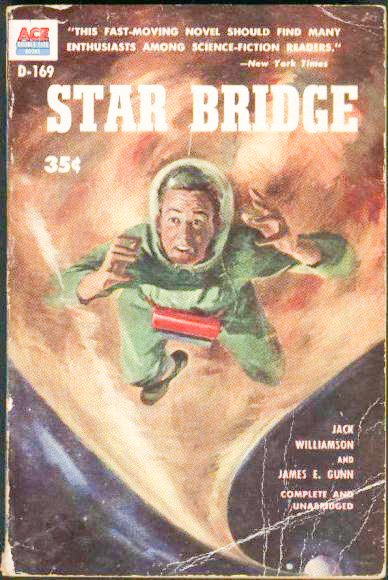 WILLIAMSON: I don’t think there’s any great difference. I wouldn’t say the fans are more honest, not as a writer (chuckling). But the fans are more numerous; you’d probably get a bigger vote. I think fans, by and large, are pretty intelligent and sophisticated. To me, the Hugo is just as important as the Nebula, certainly.
WILLIAMSON: I don’t think there’s any great difference. I wouldn’t say the fans are more honest, not as a writer (chuckling). But the fans are more numerous; you’d probably get a bigger vote. I think fans, by and large, are pretty intelligent and sophisticated. To me, the Hugo is just as important as the Nebula, certainly.
TANGENT: Since this month, April, is the 50th anniversary of what is considered modern science fiction, we’d like to have some of your thoughts on the subject—past, present, and future.
WILLIAMSON: It’s hard to say. It’s been so much of my life it’s hard to see the forest for the trees. One thing I think is important, or striking, is the loss of faith in the technology and the future that I’ve seen through the years in science fiction. Gernsback seemed to believe that science fiction was absolutely good, that new gadgets were wonderful. He did publish a lot of pessimistic stories, incidentally, but I think that through the years there’s been a loss of faith in technology and the future and ourselves. I hope to somehow see this reversed. It seems to me that technology got us where we are, and it’s gotten us into a position where we can’t live without technology, and that we need to have a revival in ourselves and our future. That’s what I would hope for.
I think we can’t save ourselves without the aid of technology, and we’re more likely to save ourselves if we realize this and try to use technology in a fruitful, sane way, than we are if we simply give up and say that technology is bad and it’s done us in and there’s nothing we can do about it.
TANGENT: What role do you think science fiction plays in this?
WILLIAMSON: Well, there is a certain amount of science fiction—that is—there are people like Asimov and Campbell, Heinlein and Ben Bova, Gordy Dickson and Arthur Clarke, who are alert to the useful possibilities of science; they don’t write unadulterated optimism, if they did it wouldn’t sell, but…I think science fiction can point ways out of our problems.
TANGENT: We can blow our own horns as much as we want to, but it seems things are going to continue the same way.
WILLIAMSON: Well, it’s an interesting time in which to be alive. Certainly science fiction is becoming more widely read and more influential than it used to be. My own stories, in translation, are pretty widely read in most of the technological cultures. I don’t know about behind the iron curtain, but… In Western Europe and Japan science fiction is very much alive. I don’t know how influential it is, but we’re living in a kind of explosion, we’re living in a transitional age; there are all sorts of things that are happening that can’t keep on happening for more than a generation, or more than a few generations. But I just think that it’s all gone too far. We’ve lost faith in everything and everyone. In literary terms you can make a contrast between Classicism and Romanticism, with the classicist valuing society and social values and saying that Man is born corrupt and he has to be educated, as opposed to the romanticist who says we’re born good, and trailing clouds of glory and that we’re likely to be corrupted.
It seems to me we can’t survive without some social structure and organization, that we’re living in an age now where every social institution and structure is either under question or demolition. This way is chaos, or surrender, to someone who has a stronger social structure, such a you find in the People’s Republic of China or in Russia.
TANGENT: Do you see any rays of light for our future?
WILLIAMSON: Well, there’s hope. I’m not in despair, but I’m also worried. I’m writing a newspaper column for a paper in New Mexico called “The Tricentennial Century,” trying to forecast what might happen in a hundred years from now. This has been quite an interesting experience because it forces me to look at the possibilities of education, of communication, and this or that, and I try to end each column on an optimistic note, if I can, but sometimes it’s pretty difficult. I’m not certain what’s going to happen, but certainly if we give way to terror and dismay we’ve lost the battle. I think with our technology—especially in the fields of education and computers—we have a possibility to do pretty much anything we want to, and we ought to make the most of our opportunity.
TANGENT: This is the silliest question I’ve ever asked, I think, but if you could give the President some science fiction, what would you give him?
WILLIAMSON: Well, there’s so many kinds of science fiction. I’d want him to read some Clarke, some of Heinlein’s juveniles… I think it might be very important. It seems to me that the distinctive thing about science fiction is that it always looks ahead in a world that is largely attached to the past, and is blind to the future. And I think, that by and large, people are blind to the consequences of what they are doing. When the teamsters are insisting on their increase in wages they’re barreling in an inflation that’s going to force them to strike again and again, resulting in the gradual destruction of our whole economy.
TANGENT: Are you writing any science fiction now? I know you write things for Algol.
WILLIAMSON: I’m very much interested in Algol. Algol is a beautiful magazine, and Andy Porter has a nice understanding of science fiction, what it’s all about. He’s publishing a very useful and beautiful and interesting magazine about science fiction.
Of course, considering my writing, I’m a full-time college professor in a school where we have a twelve hour load, and I manage to teach a variety of courses, ranging from teaching English as a second language to James Joyce to Advanced Comp., to the Motion Pictures to Linguistics, which keeps me from getting bored, but also keeps me very busy, so I don’t have time to write. I write mostly during vacations. But now I have a novel sold to Bobbs-Merrill called Brother to Demons, Brother to Gods in which I’m attempting to push the notions of genetic engineering as far as I can. I’ve sold the first 12,000 words to Ben Bova as a novelette. I’ve been meaning to ask Ben when that would appear, if I ever get the chance. He bought it last fall, and I have the second one almost finished. I’d like to finish the book this summer, but I’m not certain.
TANGENT: What are your feelings on the SFRA?
WILLIAMSON: I have mixed feelings. If we’re going to teach science fiction, which is not a bad thing to do, we need some standards of scholarship and so forth in the field. But it seems to me that some of the academics involved are kind of near-sighted, opportunistic, so infected by the virus of publish-or-perish, or whatever, and there’s a lot of—quote—scholarship, that is not very scholarly or necessary.
TANGENT: But in theory it’s a good thing?
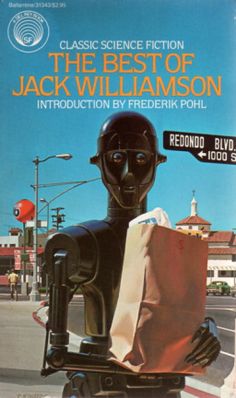 WILLIAMSON: I see no harm in it. Certainly you can’t stop it. I wouldn’t want to stop it if I could. I feel it might be bad for some writers who would write for the critics instead of the public. I have feelings like that about Chip Delany, for example. I think if he had an editor who was rejecting thing like Dhalgren and accepting things that had more plot… He’d certainly produce things that I like better, but… (smiling) So long as Dhalgren sells like it is, then why not?
WILLIAMSON: I see no harm in it. Certainly you can’t stop it. I wouldn’t want to stop it if I could. I feel it might be bad for some writers who would write for the critics instead of the public. I have feelings like that about Chip Delany, for example. I think if he had an editor who was rejecting thing like Dhalgren and accepting things that had more plot… He’d certainly produce things that I like better, but… (smiling) So long as Dhalgren sells like it is, then why not?
I think Heinlein was writing stories that I liked better when he was writing for his juvenile editors at Putnam than he is now, when his publishers will buy anything he writes. His books sell well, and people like them, and he’s doing what he wants to do, so why not?
TANGENT: What do you think of the women’s lib movements, on and off the campus and in science fiction?
WILLIAMSON: One thought on this relates to my feelings about the destruction of society by the Romanticists. I feel that women’s lib is one aspect of Romanticism; it elevates the individual at the expense of society. It may be wonderful for the individual here and now, but it tends to be destructive of the whole society. In other ways I am pro women’s lib, when it comes to pay and jobs and that sort of thing.
TANGENT: Where do they go too far, then?
WILLIAMSON: Well, for one thing, it seems to me that many women’s libbers are animated by hatred of machismo, men, and the whole establishment in which they feel they may have been banished or oppressed or whatever, and what they’re doing is motivated by hate rather than love, and is destructive rather than creative. I think Joanna Russ’ The Female Man is a thing of this sort. The theme is so strong in it that it destroys the fictional values, and the aesthetic values.
TANGENT: Was she trying to write a “novel” as such?
WILLIAMSON: Oh, yes. It is a tract of propaganda, and is certainly Why Not writing.
TANGENT: What about some of the other science fiction writers?
WILLIAMSON: Well, The Left Hand of Darkness strikes me as my favorite recent novel. It’s a beautiful piece of work; a nice examination of the role of sex, and is not distorted by any propagandistic motives. It’s certainly a great work of art in a way The Female Man doesn’t even want to be.
TANGENT: Have you seen Pamela Sargent’s Women of Wonder?
WILLIAMSON: It struck me as a nice piece of women’s lib literature. It would be excellent to use in a women’s studies class, or something like that. I think Pamela Sargent is not quite so vehement as Joanna Russ. She’s more moderate, or kind, or whatever.
TANGENT: Has there been any reaction from some of the older female SF writers? Judy Merril for instance?
WILLIAMSON: There’s quite a contrast here, if you look at it. Judy Merril, why she was an early activist, very much in the same vein as Joanna Russ. People like Leigh Brackett and C. L. Moore are sort of playing masculine roles. They’re accepting the cliché and working within it. C. L. Moore wrote these Jirel of Joiry stories with a super girl for a hero, and they’re wonderful stories.
TANGENT: Are there any male science fiction writers who can write adequately about women, or even write a good love scene?
WILLIAMSON: I think you have so many stereotypes or attitudes or assumptions that that question can’t be answered. There are some men who can write love scenes and some who will say it’s satisfactory, and others won’t.
TANGENT: Is there anything else you’d like to say in your defense?
WILLIAMSON: I hope I haven’t said too much on this tape. That I haven’t revealed too many prejudices, or incriminated myself or offended my friends.
the end
